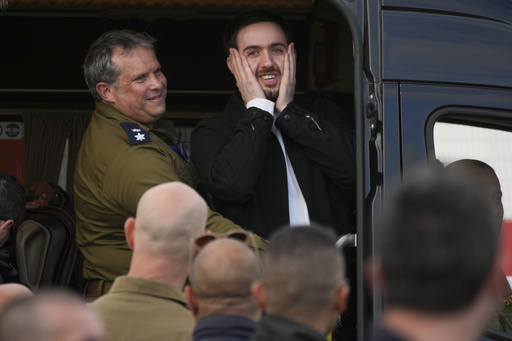
TEL AVIV, Israel — On Saturday, Hamas released the last six surviving hostages anticipated in the initial phase of its ceasefire with Israel, with just a week remaining in the arrangement. Concerns over the future of this delicate agreement have been rising as discussions about the next phase remain uncertain.
Among those freed were three Israeli men who were abducted during the Hamas-led attack on October 7, 2023, at the Nova music festival, and another man taken while visiting his family in southern Israel. Two additional hostages had been held in Gaza for a decade after entering the region voluntarily.
During the transfer, five hostages were handed over in orchestrated ceremonies that both the Red Cross and Israeli officials criticized as inhumane and disrespectful. The hostages were accompanied by masked and armed Hamas fighters in front of large crowds of Palestinians. Omer Wenkert, Omer Shem Tov, and Eliya Cohen were presented with Hamas fighters nearby. Shem Tov, under pressure, displayed a forced smile, kissing two militants while blowing kisses to onlookers. Although they donned imitation military uniforms, none of the men were serving soldiers at the time of their abduction.
Cohen’s relatives and friends in Israel cheered his return, chanting his name repeatedly. “You’re heroes,” Shem Tov remarked to his parents upon their emotional reunion, stating how much he had longed to see them again. His father, Malki Shem Tov, shared with public broadcasters that his son had been isolated after the first 50 days, during which he lost a significant amount of weight.
Earlier that same day, two other hostages, Tal Shoham, 40, and Avera Mengistu, 38, were also released. Mengistu, who is of Ethiopian descent, had entered Gaza in 2014 and has faced ongoing mental health challenges, as reported by his family. Shoham was taken from Kibbutz Be’eri; his family had previously been released in an exchange earlier in 2023.
In addition, Israel’s military announced the release of Hisham Al-Sayed, 36, a Bedouin Israeli who had crossed into Gaza in 2015 and has also dealt with mental health issues.
The ceasefire deal, which has temporarily halted the most violent confrontations between Israel and Hamas, faced setbacks when the release of over 600 Palestinian prisoners — marking the largest single-day prisoner exchange in this ceasefire phase — was postponed, allegedly due to security evaluations by Israeli authorities.
This followed a distressing incident where Hamas mistakenly returned the wrong body for Shiri Bibas, an Israeli mother who was taken hostage along with her young children. The remains turned out to belong to a Palestinian woman, prompting Israeli Prime Minister Benjamin Netanyahu to promise consequences for the “malicious violation,” while Hamas claimed it was a mistake. Israeli forensic experts eventually confirmed Bibas’s body had been correctly identified in a subsequent handover.
As discussions surrounding the next phase of the ceasefire loom, uncertainty remains. Hamas has stated that it will not release any more hostages without a stable ceasefire and a complete Israeli withdrawal from Gaza. Netanyahu, backed by the support of the U.S. administration, maintains his commitment to both neutralizing Hamas’s capabilities and ensuring the return of all hostages, which many view as contradictory objectives.
An Israeli official indicated that Netanyahu would consult with security aides regarding the future of the ceasefire, with a focus on retrieving all hostages, regardless of their conditions. This conversation occurred under conditions of anonymity, given the lack of formal announcements regarding the meeting.
The Beilinson hospital reported that the freed hostages underwent an “extremely difficult period in captivity,” although further details were withheld at the families’ request. Niva Wenkert, mother to Omer, opined that while he appeared physically fine, his internal state remained uncertain.
As hostages return, their families have been vocal in demanding comprehensive arrangements for the safe return of those still captive. “This moment is unforgettable, with emotions running high,” noted Shoham’s family, emphasizing the need for a deal to secure the release of all remaining hostages.
In Tel Aviv, protests were held to urge Netanyahu’s government to expedite negotiations for the remaining captives. “Isn’t it strange that external parties are more dedicated to bringing home Israeli hostages than you are?” questioned Naama Weinberg, a relative of a deceased hostage, directly addressing Netanyahu. “These are your citizens, and they were abandoned under your oversight!”
The impending release plan involves 620 Palestinian prisoners, including 151 who are serving significant sentences for offenses against Israelis. Nearly 100 are expected to be deported, with several notable prisoners on the list, including Nael Barghouti, who spent over four decades imprisoned for attacking an Israeli bus driver. The remaining group comprises men, teenagers, and one woman, all captured by Israeli forces amidst the conflict.
The conflict has seen devastating consequences, with reported fatalities exceeding 48,000 Palestinians, predominantly women and children, as per Gaza health authorities, which do not differentiate between combatants and non-combatants. Israel contends that over 17,000 militants have been killed but has not presented evidence.
This offensive has ravaged much of Gaza, causing extensive destruction and leaving vast areas uninhabitable. The initial Hamas attack on October 7 precipitated the war that has resulted in around 1,200 Israeli deaths, with many casualties being civilians, alongside hundreds of soldiers lost during the ongoing conflict.

